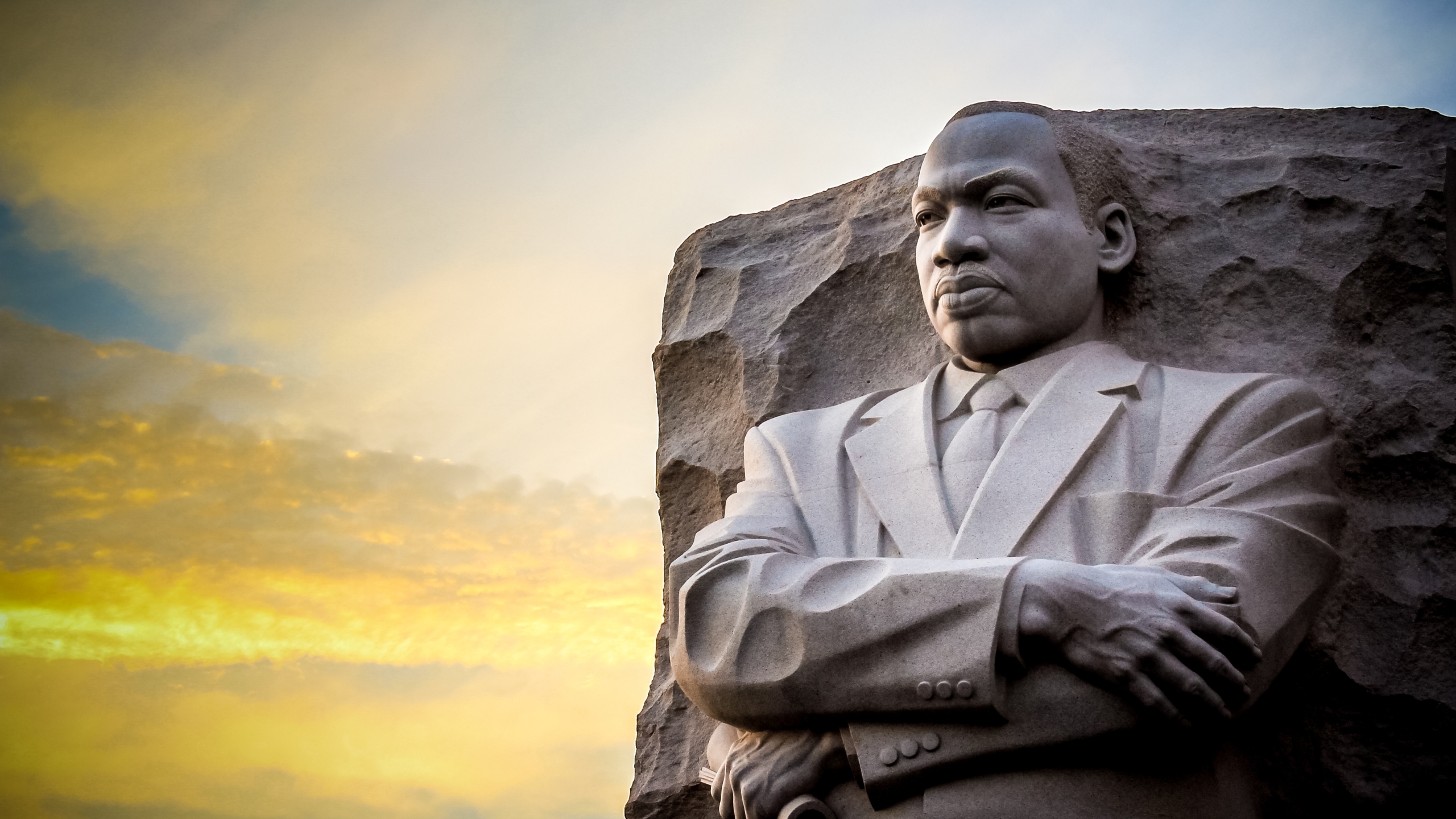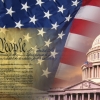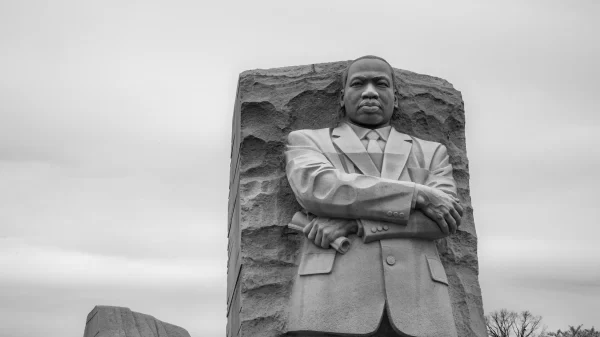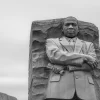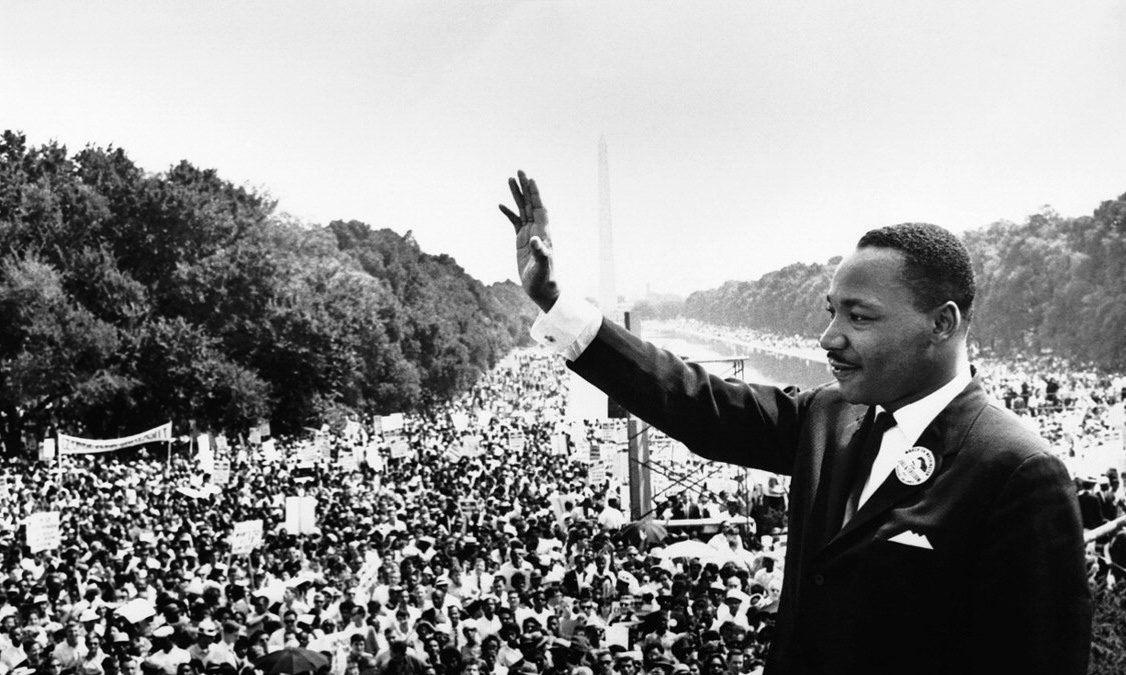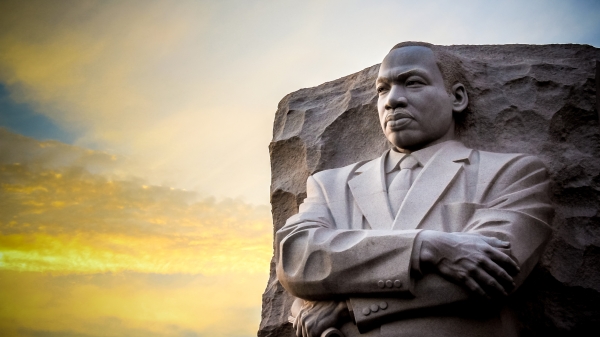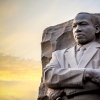When President Ronald Reagan signed HR3706, the bill making Dr. Martin Luther King, Jr.’s birthday a national holiday on November 2, 1983, the president quipped “I would have preferred a non-holiday for King’s honor but since they seem bent on making it a national holiday. I believe the symbolism of the day is important enough that I will sign the legislation.”
The President’s message was not lost on Dr. King’s widow. After watching the U.S. Senate debate and pass the King holiday bill, Coretta Scott King remarked. “It is a great day… We’re proud to be Americans, but…today, we’re even prouder.”
Mrs. King’s remarks recall sentiments expressed by W. E. B. Du Bois more than a century earlier. Commenting on the flagging allegiance Blacks sometimes felt about a country that did not reciprocate the same commitment to its Black citizens that they showed to the United States. Du Bois noted, “One feels his twoness, an American, a Negro, two souls, two thoughts, two unreconciled strivings, two warring ideas in one dark body…”
The banner, “Racism Killed Our Brother,” that hanged on the face of Brown Chapel AME Church in Selma during the March 1965 funereal of civil rights martyr Jimmie Lee Jackson figuratively hung on the church fronts of Black churches across America in April 1968 after King’s death. Black rage manifested itself in the burning of numerous American cities. King argued, “a riot is the language of the unheard.”
My mother drove me to Broadway in my hometown of Gary, Indiana to show me the glass strewn, charred buildings following King’s execution. Even Washington, DC did not escape the same destruction. When I arrived the nation’s capital in 1976 to begin my undergraduate studies at Howard University one still saw the aftermath of the so-called King riots along Georgia Avenue near Howard’s campus. Professors still talked about the smoke bellowing and sirens blaring around Howard University Hospital throughout the night of April 4th.
My sojourn in the District of Columbia coincided with the political donnybrook on Capitol Hill and at the White House, over establishing a national holiday for Dr. Martin Luther King Jr. Washington, DC Mayor Marion S. Barry, formerly, the first National Chairman of SNCC, the Student Non-Violent Coordinating Committee, helped spearhead this effort. A member of Alpha Phi Alpha, Dr. King’s fraternity, Barry governed a city where Congress approved the District of Columbia’s budget and lorded over a mostly Black city where residents experienced taxation without representation in Congress. Rev. Walter Fauntroy, a member of SCLC, became the District of Columbia’s first non-voting member in the U.S. House of Representatives.
He was a Democrat. The lack of statehood was another form of Jim Crow.
Michigan Democrat, Congressman John Conyers, introduced the bill to make Dr. Martin Luther King, Jr.’s birthday a national holiday hours after King’s assassination in Memphis. Conyers had only been in Congress for four years. In 1964, he hired Mrs. Rosa Parks to work in his Capitol Hill Congressional office, which she did until her retirement in 1988. Raymond and Rosa Parks moved to Detroit in 1957. Conyers and Parks became the perfect tandem of moral suasion in the collective effort for a MLK Jr. national holiday. The legislation took fifteen years to pass both houses of Congress.
The grassroots lobby included the Congressional Black Caucus collecting over 300,000 signatures on a petition. The singer and songwriter Stevie Wonder wrote “Happy Birthday” partly in tribute to Dr. King and partly as the cadence for the King holiday. Political opponents trotted out the usual diatribes. North Carolina U. S. Senator Jesse Helms filibustered the measure for sixteen days alleging that Dr. King was a Communist sympathizer. Helms provided fellow senators with a 300-page dossier intended to prove King’s Red taint. New York Senator Daniel Patrick Moynihan thew his copy to Senate floor calling it “rubbish.”
A reporter asked President Ronald Reagan if he thought King was a Communist. The president replied, “We will know in about thirty-five years,” alluding to documents on the King assassination sealed by a federal court from the public.
Indiana Congresswoman Katie Hall authored the actual bill signed by Reagan. The big difference between Hall’s and Conyers’s bills is that Hall’s bill designated the third Monday of every January rather than January 15th , King’s actual birthday, as the King national holiday. Hall became the first Black woman from Indiana elected to Congress.
The civil rights movement gave Rev. Martin Luther King, Jr. an international platform to inveigh global injustice. He saw privation in his own country and the world and readied himself to make a difference. Some of his lieutenants and other civil rights leaders did not always appreciate his jeremiads.
King used a sermon he gave at the Riverside Church in New York City to criticize the United States’ role in the Vietnam War and to question the misguided federal appropriations of a country that spent more money on bombs than on butter and bread. King used his 1963 speech at the Lincoln Memorial on the National Mall to gainsay the paucity of gainful employment for too many Americans especially Black Americans. He argued for a Poor People’s Campaign. Such sophomoric entreaties earned him the wrath of the White House and the ridicule of some white and Black politicians and members of the press.
Presidents John F. Kennedy and Lyndon Johnson believed King strayed in areas outside of his ministerial purview. FBI Director J. Edgar Hoover called King a fraud. Certain members of King’s inner circle cautioned him against interceding in the sanitation worker strike in Memphis arguing that the labor dispute was not their business. King dismissed the criticism as a false dichotomy arguing that labor rights and civil rights were two sides of the same coin.
Martin Luther King, Jr. was not a perfect leader, and his insights and perspectives grew during his brief life. He had many mentors from his family, the men in the neighborhood pool halls, barber shops, the preachers in Atlanta’s Black pulpits, teachers and college professors, and civil rights organizations including FOR, the Fellowship of Reconciliation.
As a son of the South, he knew the unfulfilled promises of Reconstruction and the rearguard determination of neo-Confederates and Southern apologists to maintain home rule. He knew that America’s original sin was Black enslavement which codified segregation and legitimized white racism. He told us at the end of the Selma to Montgomery March, “Someone asked how long would prejudice blind the visions of men?” “Not long,” Dr. King assured America, “Because truth crushed to earth shall rise again. How long? Not long, because no lie can live forever… How long? Not long, because the moral arc of the universe is long, but it bends toward justice.”
Dr. Martin Luther King, Jr’s national holiday reminds us of his often-stated axiom, “Injustice tolerated anywhere threatens justice everywhere.” To King, it would not matter whether these injustices took place at the U.S. Capitol in Washington, DC on 1/6/2021, or in Kiev, Ukraine on 2/24/2022. Dr. King would have been the first to borrow a stanza from a popular song of Montgomery’s own Nat King Cole, “Ain’t Gonna Study War No More.”







































